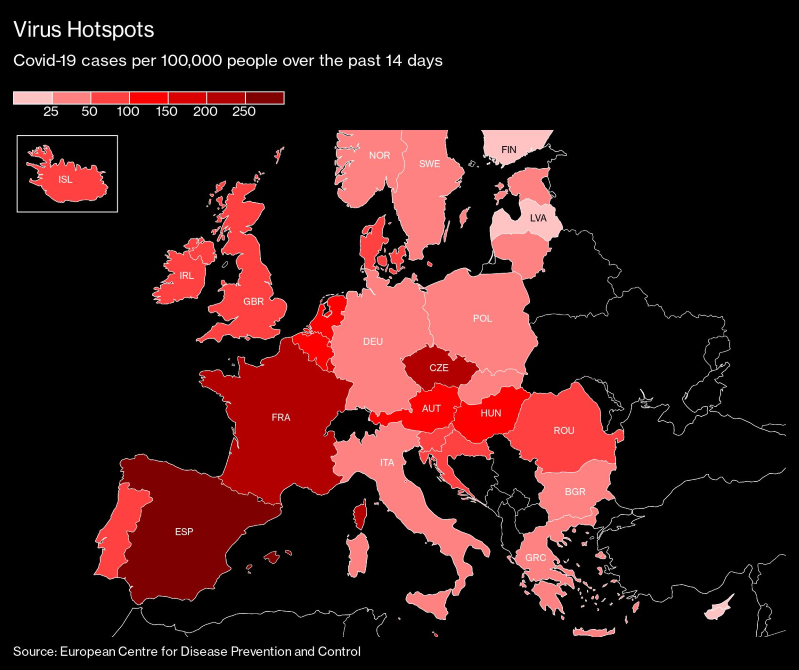By Alan Katz, Rodrigo Orihuela and Neil Callanan, Bloomberg News–
European leaders are grappling with how to bring the coronavirus back under control as hospitalizations climb following a surge in cases to record levels in some countries.
Madrid’s local government will decide on Friday whether to expand restrictions on movement in the city and its suburbs. Nearly 40% of intensive-care beds in the region around the Spanish capital are filled with Covid-19 patients compared with 17% nationwide, raising the specter of a health-care collapse similar to the grim scenes southern Europe experienced last spring.
French Health Minister Olivier Veran will travel to hard-hit Marseille to confront local detractors of the government’s order closing bars and restaurants in the Mediterranean port city for at least two weeks. During his visit to the region’s biggest hospital, he plans to highlight strained health-care resources in France’s second-largest urban area.
Europe’s biggest economies are experiencing a disquieting spike in infections, adding to risks weighing on an already slowing recovery. France on Thursday saw a record 16,096 new Covid-19 cases, and the U.K. reported another 6,634, the highest daily total since the start of the pandemic. Germany had 2,321 new cases on Friday, the most since April.
Authorities across the region are fighting back with a series of piecemeal measures dubbed “lockdown lite.” Austria has banned apres-ski partying, Spain is restricting movement in 37 hotspots in and around Madrid, and the U.K. urged people to work from home for six months and shut down its pubs an hour early.
France followed suit by announcing it would close bars at 10 p.m. in Paris and several other urban centers, and shut them entirely in the Marseille region where the health-care system is facing acute strain. The question remains if it’s enough as the continent heads into the winter flu season.
“If we don’t act, we could end up in a situation close to what happened in the spring — that could mean a new lockdown,” French Prime Minister Jean Castex said on France 2 television. “The situation is very worrying in the country, and especially serious in large metro areas.”
President Emmanuel Macron’s government is seeking to ease tension after the first significant tightening of restrictions on French daily life since the end of the lockdown in May. Several hundred restaurant owners and bar keepers in Marseille were protesting against the government measures on Friday, according to Agence France-Presse.
The country will step up efforts to aid employees of restaurants and bars impacted by the measures, according to Labor Minister Elisabeth Borne.
Employees will be “fully compensated” during the period of shutdown, Borne said in an interview with France’s CNews channel on Friday. Measures to aid the sector will include cancellation of social and fiscal charges in the period, with the solidarity fund becoming “much more generous, powerful,” she said.
The prospect of more restrictions on economic activity and social interactions is generating political tensions.
At least 40 MPs from Britain’s ruling Conservative Party have backed draft legislation that would give Parliament more powers to challenge measures imposed by the government. Madrid has seen street protests in working-class areas subject to new restrictions, with locals claiming the regional government is discriminating in favor of wealthier neighborhoods.
There were 1,481 people hospitalized with coronavirus in England on Thursday, an increase of about 50% from a week earlier, according to government data.
The U.K.’s test and trace system is feeling the strain with some being offered tests long distances from their homes. Millions of people across the country have been placed under local restrictions, and Prime Minister Boris Johnson has told office workers to spend the next six months working from home if possible.
Compliance with rules around self-isolation remains the exception. Just one in five people did not leave home after developing symptoms, according to a study for the Department of Health and Social Care.
Pandemic dispatches from across Europe:
| Italy, the original epicenter of the pandemic in Europe, has managed to keep the disease largely in check, but it is reacting to a recent uptick. The Campania region surrounding Naples moved to reinstate the mandatory use of masks in most public places as did several Italian cities. |
| In Denmark, the number of daily new cases is now higher than during the worst moments of the pandemic back in March and April. Pressure on intensive care capacity is expected to intensify in the coming weeks, Joachim Hoffmann-Petersen, chairman of Denmark’s leading center for anesthesiology and intensive-care treatments, told Ritzau. |
| Greece’s health system is starting to feel pressure with cases rising mainly in Athens. Prime Minister Kyriakos Mitsotakis urged Greeks to wear masks, but promised that the health care system can handle the current crisis, with plans to open more than 200 new intensive care units. |
| Belgium recorded the highest number of new hospital admissions since early May on Thursday, and the number of patients being treated in intensive care units crossed the threshold of 100 for the first time since June. Still, that’s a far cry from a peak of 1,285 severe Covid-19 patients on April 8. |
| The number of hospitalized coronavirus patients in Ireland has nearly tripled so far in September compared with August. |
(Recasts with additional details from across Europe)
For more articles like this, please visit us at bloomberg.com


Leave A Comment
You must be logged in to post a comment.